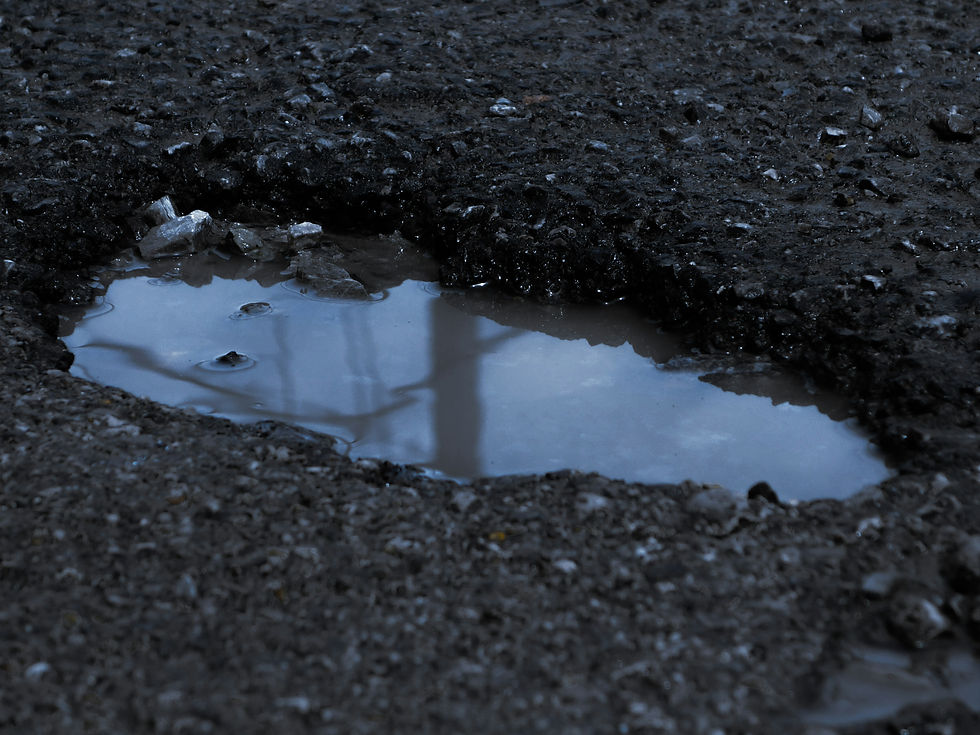HealthGap Project

The Hidden Health Cost of Bad Roads
Jahnavi Pericherla
This article explores how poorly maintained roads, especially potholes, contribute to chronic spinal and musculoskeletal problems, imposing both health and economic burdens. It highlights the legal responsibilities of municipal authorities, the human impact on commuters, and the urgent need for government action and public discourse on road safety.
When I was younger, I rarely heard of conditions like slipped discs or sciatica. Since the past 10 years, I see so many people including my own family members battling chronic back or joint pain. I have even come across memes from social media highlighting how millennials in their early 30s and late 20s are already suffering from the aches our grandparents only began experiencing in later years.
It doesn’t take rocket science to understand why. One of the most obvious culprits is the appalling state of our roads. I vividly recall visiting a tier-2 city in Andhra Pradesh a few years ago. The roads were so riddled with potholes that a single auto ride left me wondering how unbearable daily commuting must be for those who rely on them every day.
Curious about whether public health campaigns or government initiatives had addressed the long-term health consequences of poor road conditions, I began doing my own little research.. To my surprise, there is almost no systematic research on this topic. Apart from a few articles where doctors and physiotherapists have pleaded for urgent government action, the long-term musculoskeletal impact of bad roads remains largely neglected (IIPHS, 2024).
Perhaps this explains the silence: spinal and musculoskeletal issues rarely make headlines the way road fatalities do. They are often dismissed as “minor” because they aren’t immediately fatal. Yet, this perception is misleading.
The spine is the body’s central support system, enabling mobility, balance, and flexibility. Rough and uneven roads put it under constant strain. Daily commuters, particularly office workers with limited physical activity, are especially vulnerable. Continuous jolts and vibrations from pothole-ridden roads can lead to stress fractures, disc bulges, chronic pain, dizziness, or numbness. Two-wheeler riders, often over 40, are among the worst affected, experiencing flare-ups of spondylitis or long-term spinal damage. Severe jolts or whiplash injuries from sudden braking can exacerbate pre-existing conditions, sometimes resulting in partial paralysis and the need for surgery (IIPHS, 2024).
Spinal injuries including damage to vertebrae, spinal cord, and surrounding tissues carry significant personal and societal consequences. They frequently result in permanent motor or sensory loss, autonomic dysfunction, and sharply reduced quality of life. Beyond the human toll, it leads to substantial economic burden with emergency care, surgeries, long-term rehabilitation, and disability support all of which add up, particularly in low- and middle-income countries where healthcare infrastructure is already strained (Frontiers in Public Health, 2025).
A study conducted in a tertiary care hospital in North-West India between 2014 and 2015 underscored the financial burden of musculoskeletal injuries from road traffic crashes. it found that treatment costs averaged ₹20,386 for surgical cases, ₹3,726 for conservative care, and about ₹24,000 when both approaches were needed. Indirect costs such as transportation, lodging, and food added significantly to the burden, particularly for those opting for conservative care (LWW Journal of Science and Clinical Practice, 2017).
In India, municipal corporations are legally responsible for maintaining roads within their limits. When negligence leads to accidents, the State can be held liable under the law of torts. The Supreme Court, in State of Rajasthan v. Vidyavati, affirmed that the State is accountable for tortious acts of its servants, extending beyond contractual liabilities under Article 300 of the Constitution. Subsequent rulings, including S. Rajaseekaran v. Union of India and a 2018 Supreme Court order, recognized the severe public safety risks posed by potholes and held municipal authorities responsible for avoidable deaths. Similarly, the Bombay High Court in 2015 affirmed that properly maintained roads are part of the fundamental right to life under Article 21, giving citizens legal grounds to claim compensation for failures (Neetini Yaman, 2022).
Globally, the countries that have successfully reduced road crashes share some common approaches. These include strong political commitment, a multi-pronged strategy encompassing engineering, and education, clear targets for reducing accidents, concrete plans for implementation, and institutional coordination across governmental levels and with private stakeholders. (PMC, 2007).
In India, potholes remain one of the most persistent and preventable causes of road injuries. Despite repeated awareness campaigns and promises of reform, roads riddled with potholes continue to endanger lives and livelihoods. In 2022 alone, India recorded 4,446 accidents directly linked to potholes, a stark reminder that inadequate infrastructure is not just an inconvenience, but a serious public health crisis (Neetini Yaman, 2022).
Despite the clear evidence of harm caused by poorly maintained roads, chronic spinal injuries, and the economic burden on families, public discourse around this issue remains minimal. Unlike road fatalities, the long-term consequences of rough roads often go unnoticed, leaving victims without adequate attention or support. It is time for this conversation to gain momentum. Policymakers, municipal authorities, and public health experts need to recognize the seriousness of the problem and step up with concrete action plans. Only through sustained awareness, political commitment, and coordinated infrastructure management can we hope to prevent these avoidable injuries and ensure safe, healthy commuting for all citizens.
Our Newsletter
HealthGap Project
About | Contact us